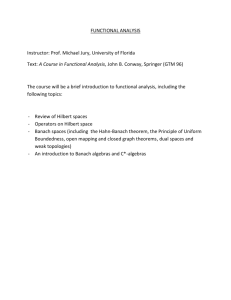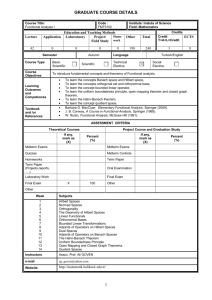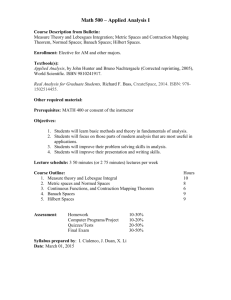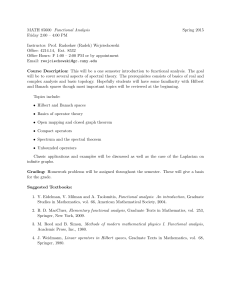3103 (Functional Analysis)
advertisement
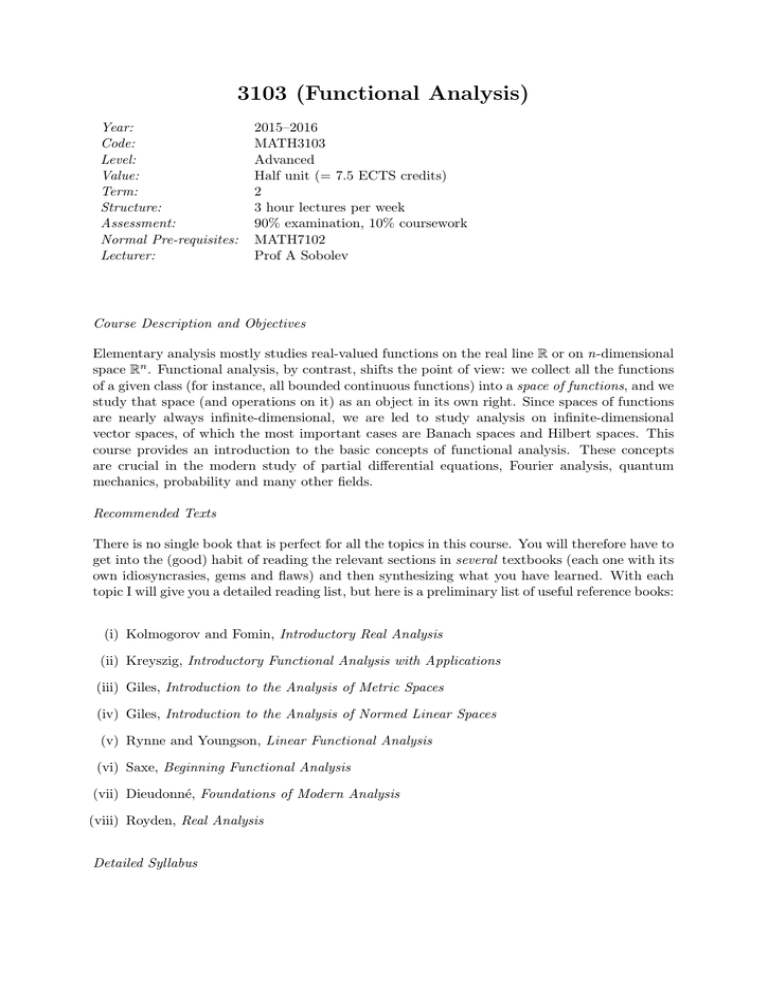
3103 (Functional Analysis) Year: Code: Level: Value: Term: Structure: Assessment: Normal Pre-requisites: Lecturer: 2015–2016 MATH3103 Advanced Half unit (= 7.5 ECTS credits) 2 3 hour lectures per week 90% examination, 10% coursework MATH7102 Prof A Sobolev Course Description and Objectives Elementary analysis mostly studies real-valued functions on the real line R or on n-dimensional space Rn . Functional analysis, by contrast, shifts the point of view: we collect all the functions of a given class (for instance, all bounded continuous functions) into a space of functions, and we study that space (and operations on it) as an object in its own right. Since spaces of functions are nearly always infinite-dimensional, we are led to study analysis on infinite-dimensional vector spaces, of which the most important cases are Banach spaces and Hilbert spaces. This course provides an introduction to the basic concepts of functional analysis. These concepts are crucial in the modern study of partial differential equations, Fourier analysis, quantum mechanics, probability and many other fields. Recommended Texts There is no single book that is perfect for all the topics in this course. You will therefore have to get into the (good) habit of reading the relevant sections in several textbooks (each one with its own idiosyncrasies, gems and flaws) and then synthesizing what you have learned. With each topic I will give you a detailed reading list, but here is a preliminary list of useful reference books: (i) Kolmogorov and Fomin, Introductory Real Analysis (ii) Kreyszig, Introductory Functional Analysis with Applications (iii) Giles, Introduction to the Analysis of Metric Spaces (iv) Giles, Introduction to the Analysis of Normed Linear Spaces (v) Rynne and Youngson, Linear Functional Analysis (vi) Saxe, Beginning Functional Analysis (vii) Dieudonné, Foundations of Modern Analysis (viii) Royden, Real Analysis Detailed Syllabus − Metric spaces and their basic properties. Completeness and completion. Compactness and equivalent properties. − Normed linear spaces and Banach spaces. Examples: Sequence spaces `p (1≤ p ≤ ∞) and c0 ; spaces C (X ) of bounded continuous functions. Proofs of completeness of these spaces. Special properties of finite-dimensional normed linear spaces. − Hilbert spaces. Basic properties. Orthogonal systems and the orthogonalization process. Representation of linear functionals on Hilbert space. − Spaces of continuous functions. Tietze extension theorem. Dini, Stone-Weierstrass and Arzelà-Ascoli theorems. − Zorn’s lemma and the Hahn-Banach theorem. − Linear functionals and duality. Dual of `p is `q . Second dual and reflexive spaces. − Baire category theorem. Uniform boundedness theorem, open mapping theorem, closed graph theorem. Problem Sets One cannot learn mathematics solely by watching someone else do mathematics (even if that ‘someone’ is a UCL professor). To learn mathematics, you must solve mathematics problems - lots of them - by yourself. Therefore, I will assign problem sets every week; they are to be handed in at the following week’s problem class. These problem sets are the most important part of the course. It is essential that you do the problem sets faithfully each week; if you put them off, even a little bit, you will have an extremely hard time catching up. Give yourself lots of time - mathematics is not a speed race - and do not expect to do a whole problem set in one sitting. If you get completely stuck on a problem, go on to another problem, and come back to the first one on a later day - your unconscious mind will be working on it in the meantime! I suggest therefore that you start on the problem set early in the week. I do not expect you to get everything right on the problem sets the first time around. (Indeed, if you do get everything right, then you should complain to me that the problem sets are not challenging enough!) Rather, the purpose of the problem sets is to give you an opportunity to struggle with the ideas discussed in class by applying them to concrete mathematical problems, and in this way to solidify your understanding of those ideas. Only by such an intellectual struggle can you learn mathematics (or anything else of value, for that matter). August 2015 MATH3103
